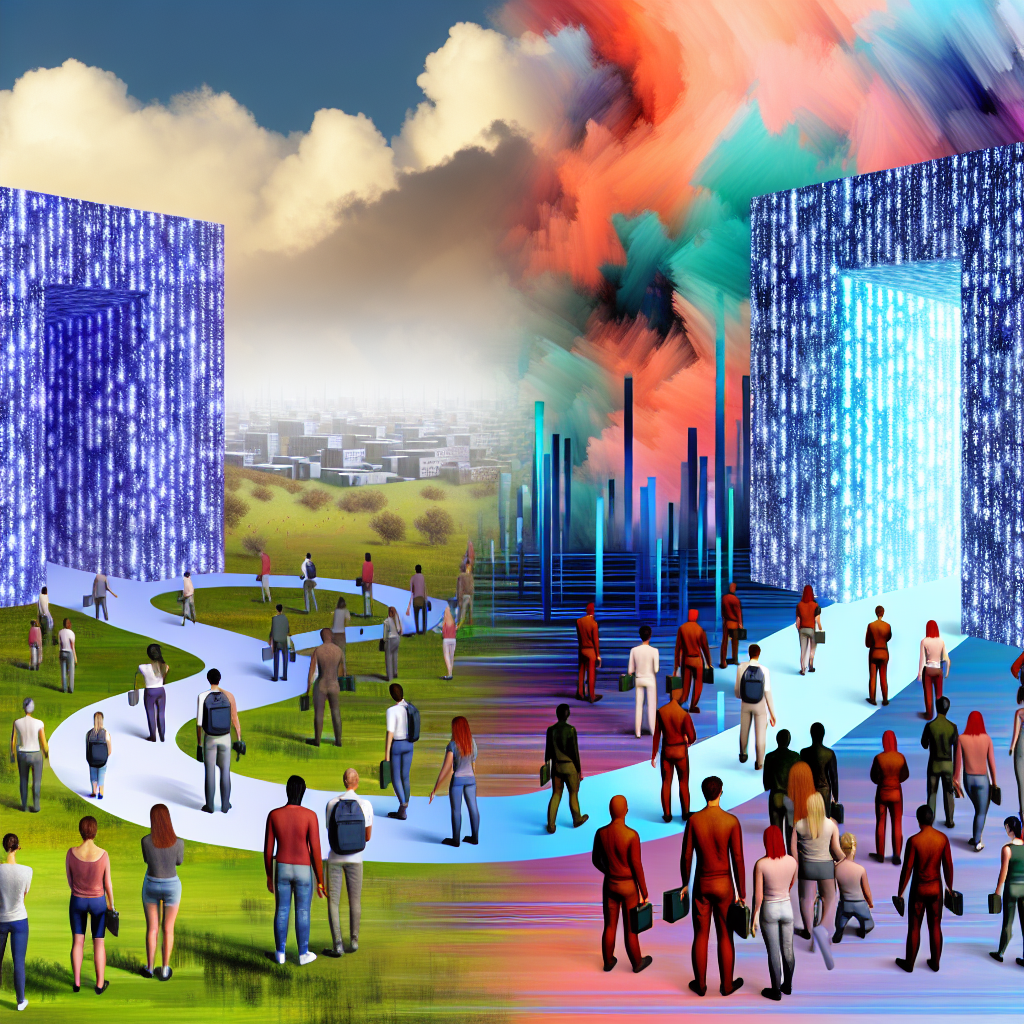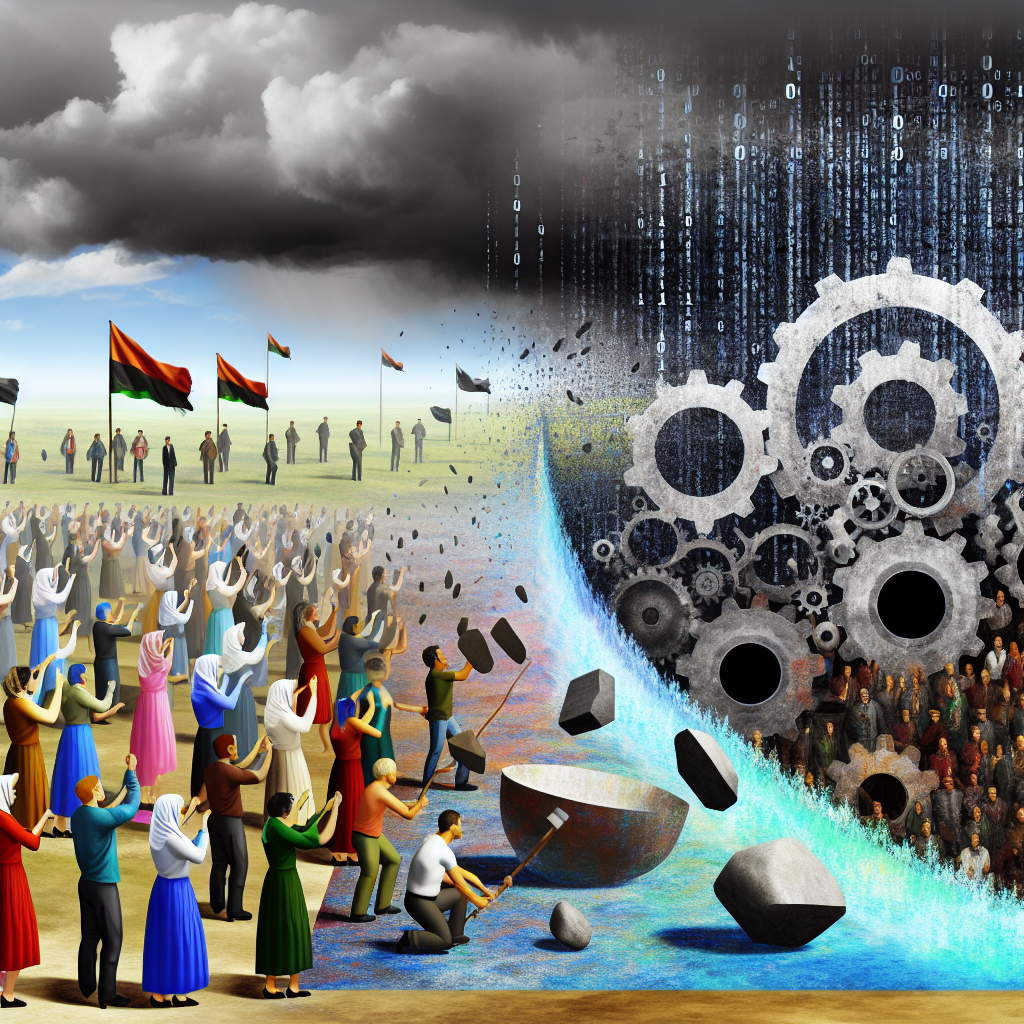The Impact of Algorithms on Online Discourse
The rise of social media and online platforms has transformed the way we communicate and engage with one another. It has opened up new avenues for expression, connection, and information sharing. However, it has also given rise to a new battleground, where humans find themselves pitted against algorithms in a never-ending culture war.
Algorithms, the complex mathematical formulas that power our online experiences, have become an integral part of our digital lives. They determine what content we see, what ads we are shown, and even what news we consume. They are designed to analyze our behavior, preferences, and interests, and then tailor our online experiences accordingly.
While algorithms have undoubtedly made our lives more convenient and personalized, they have also had a profound impact on online discourse. The algorithms that power social media platforms, for example, are designed to maximize user engagement and keep us scrolling for as long as possible. They do this by showing us content that aligns with our existing beliefs and interests, creating echo chambers that reinforce our own biases.
This algorithmic curation of content has led to the fragmentation of online communities and the polarization of public discourse. Instead of being exposed to a diverse range of opinions and perspectives, we are increasingly surrounded by like-minded individuals who share our views. This has made it easier for misinformation and conspiracy theories to spread unchecked, as they find fertile ground in these echo chambers.
Furthermore, algorithms have also been accused of amplifying extremist content and promoting divisive narratives. The algorithms that power recommendation systems on platforms like YouTube, for instance, have been criticized for pushing users towards increasingly extreme and radical content. This can lead to the radicalization of individuals and the spread of harmful ideologies.
The impact of algorithms on online discourse goes beyond just the content we consume. They also shape the way we interact with one another. Algorithms determine what posts and comments are shown to us, and they prioritize content that is likely to generate engagement. This has led to a rise in clickbait headlines, sensationalist content, and provocative statements designed to elicit strong reactions.
As a result, online conversations have become increasingly toxic and polarized. Instead of engaging in thoughtful and respectful discussions, users often find themselves embroiled in heated arguments and personal attacks. The algorithms that power our online experiences have inadvertently created an environment that rewards outrage and divisiveness, rather than fostering meaningful dialogue.
Recognizing the impact of algorithms on online discourse is crucial if we are to address the challenges they present. It requires a collective effort from both individuals and platform providers. Individuals need to be aware of the algorithms that shape their online experiences and actively seek out diverse perspectives. They should also be critical consumers of information, fact-checking and verifying before sharing content.
Platform providers, on the other hand, need to take responsibility for the algorithms they deploy. They should prioritize the well-being of their users over engagement metrics and take steps to mitigate the negative impact of algorithms on online discourse. This could include implementing transparency measures, allowing users to customize their algorithms, and promoting content that encourages constructive dialogue.
In conclusion, the impact of algorithms on online discourse cannot be underestimated. They have shaped the way we consume and interact with content, often leading to the fragmentation and polarization of online communities. Recognizing and addressing these challenges is essential if we are to foster a healthier and more inclusive online environment.
How Humans Are Fighting Back Against Algorithmic Bias

The Latest Online Culture War Is Humans vs. Algorithms
In today’s digital age, algorithms play a significant role in shaping our online experiences. From social media feeds to search engine results, these complex mathematical formulas determine what content we see and engage with. However, as algorithms become more prevalent, concerns about their biases and potential harm have emerged. This has led to a new culture war between humans and algorithms, as people strive to fight back against algorithmic bias.
Algorithmic bias refers to the unfair or discriminatory outcomes that can result from algorithms. These biases can be unintentional, stemming from the data used to train the algorithms or the inherent biases of their creators. For example, algorithms used in hiring processes have been found to favor certain demographics, perpetuating existing inequalities. Similarly, algorithms used in predictive policing have been criticized for disproportionately targeting minority communities.
Recognizing the potential harm caused by algorithmic bias, individuals and organizations are taking action to fight back. One approach is through increased transparency and accountability. Many are calling for algorithms to be more transparent, with their inner workings and decision-making processes made accessible to the public. This would allow for scrutiny and identification of any biases present. Additionally, some are advocating for independent audits of algorithms to ensure fairness and accountability.
Another way humans are fighting back against algorithmic bias is through diversifying the teams that create and maintain these algorithms. By including individuals from diverse backgrounds and perspectives, the hope is that biases can be identified and mitigated during the development process. This approach recognizes that algorithms are not neutral entities but reflect the values and biases of their creators. By diversifying these teams, a more inclusive and fair algorithmic landscape can be achieved.
Furthermore, individuals are taking matters into their own hands by actively engaging with algorithms. This involves being aware of the algorithms at play and consciously making choices to counteract their biases. For example, users can actively seek out diverse sources of information, rather than relying solely on the content recommended by algorithms. By doing so, they can expose themselves to a wider range of perspectives and challenge the echo chambers created by algorithms.
In addition to individual efforts, collective action is also being taken to address algorithmic bias. Advocacy groups and organizations are pushing for policy changes and regulations to ensure algorithmic fairness. They are calling for laws that require companies to disclose the use of algorithms and their potential biases. This would provide individuals with the necessary information to make informed decisions about the content they consume and the impact algorithms have on their lives.
While the fight against algorithmic bias is gaining momentum, it is not without its challenges. Algorithms are complex systems, and identifying and addressing biases can be a daunting task. Additionally, there is a need for ongoing research and development to improve the fairness and transparency of algorithms. However, the growing awareness and efforts to combat algorithmic bias are crucial steps towards creating a more equitable online environment.
In conclusion, the rise of algorithms has sparked a culture war between humans and these mathematical formulas. Algorithmic bias has become a significant concern, as it can perpetuate inequalities and harm marginalized communities. To fight back, individuals and organizations are advocating for transparency, diversifying algorithm development teams, actively engaging with algorithms, and pushing for policy changes. While challenges remain, the collective efforts to address algorithmic bias are essential for creating a more fair and inclusive online culture.
Exploring the Role of Algorithms in Shaping Online Communities
The Latest Online Culture War Is Humans vs. Algorithms
In today’s digital age, algorithms play a significant role in shaping our online experiences. From social media platforms to search engines, these complex mathematical formulas determine what content we see and engage with. However, as algorithms become more sophisticated, a new culture war is emerging – one that pits humans against these powerful algorithms.
Algorithms are designed to analyze vast amounts of data and make decisions based on patterns and trends. They are programmed to prioritize certain types of content, such as posts with high engagement or articles that align with a user’s interests. This has led to the creation of personalized online experiences, where individuals are served content tailored to their preferences. While this may seem beneficial, it also means that algorithms have the power to shape our worldview by filtering out opposing viewpoints.
This filtering effect has sparked concerns about the impact of algorithms on online communities. Critics argue that algorithms create echo chambers, where individuals are only exposed to information that reinforces their existing beliefs. This can lead to polarization and the spread of misinformation, as people are less likely to encounter alternative perspectives. In this sense, the culture war between humans and algorithms is a battle for diversity of thought and the preservation of open dialogue.
One example of this conflict is the rise of fake news and misinformation on social media platforms. Algorithms are designed to prioritize content that generates high engagement, such as posts that receive a lot of likes, comments, and shares. Unfortunately, this can incentivize the spread of sensationalist and misleading information, as it tends to generate more engagement than accurate reporting. As a result, algorithms inadvertently amplify the reach of fake news, making it difficult for users to distinguish fact from fiction.
Another area of contention is the issue of content moderation. Algorithms are often used to flag and remove content that violates platform guidelines, such as hate speech or graphic violence. While this automated approach can help identify and remove harmful content at scale, it is not without its flaws. Algorithms may struggle to accurately distinguish between hate speech and legitimate political discourse, leading to the unintended censorship of certain viewpoints. This has sparked debates about the role of algorithms in determining what is acceptable speech online and the potential for bias in their decision-making processes.
To address these concerns, there have been calls for greater transparency and accountability in algorithmic decision-making. Some argue that algorithms should be more transparent about how they prioritize and filter content, allowing users to have more control over their online experiences. Others advocate for external oversight and regulation to ensure that algorithms are not perpetuating harmful biases or promoting misinformation.
In conclusion, the culture war between humans and algorithms is a reflection of the growing influence of algorithms in shaping our online communities. While algorithms have the potential to enhance our online experiences, they also pose risks to diversity of thought and the spread of misinformation. As we navigate this digital landscape, it is crucial to critically examine the role of algorithms and advocate for transparency and accountability in their decision-making processes. Only then can we strike a balance between the power of algorithms and the preservation of open dialogue in our online communities.


